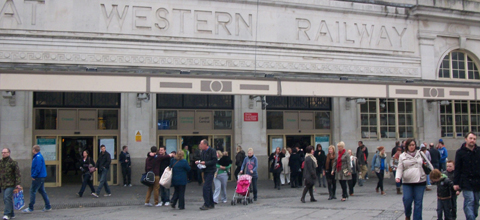Your daily commute is probably getting busier
If you’ve ever travelled on a rush hour train and have been forced to stand, squashed into the pungent armpit of a stranger as even more people pile on board, you’ll have expereinced the kind of conditions which the commuters of Cardiff are experiencing on an increasingly regular basis. How has this happened and why is a daily commute on our railway system turning into a daily chore?
Former Welsh transport minister and Plaid Cymru leader, Ieuan Wyn Jones, recently claimed that the increasingly crowded conditions on services in the Cardiff area, could have been avoided. In a recent BBC interview, Mr Jones stated that the franchise deal which granted Arriva Trains the right to run services on Welsh lines did not specifically address the issue of investment to counter balance rising passenger numbers. Mr Jones went on to say that this issue has led directly to overcrowding on certain Valley line services, particularly as passenger numbers are rising faster than anticipated. Statistics released by the Office of Rail Regulation seem to support this view, with 18,000 rail trips made within Wales during 2009-10 compared with less than 13,000 journeys made in 2003, the year the agreement was made.
The fifteen year franchise agreement, not only grants Arriva the responsibility for running all local and borders services throughout Wales, but also allows the Welsh government to subsidise these services. In the economic year 2008-9, the subsidy was a whopping £147,117,450 and it continues to be the highest rail subsidy per passenger mile in the United Kingdom.
Arriva, however, denies that the terms of the franchise agreement have negatively affected investment in their services. A statement issued in response to the comments says that the company has invested over £30 million into services since the franchise agreement, well above their contracted commitments. The statement also added that the company has already increased services in areas where passenger numbers have grown.
“Transport is key and critical for Cardiff”
All the facts and figures however, rarely capture the day to day experience of those people who rely on trains nor the rail system’s effect on the local economy. According to a 2011 employee survey conducted by Cardiff Business School and Cardiff Business Partnership (CBP), Cardiff attracts over 70,000 commuters from its surrounding area everyday and around a fifth of these commute via train.
Dr Andrew Crawley of Cardiff University is one of the report’s authors and was surprised that travel emerged as such a big issue in an employee survey. “Cardiff is essentially a commuter city. Our population is about 300,000 people, which is incredibly small for a capital city in terms of actual working stock (people being able to do a job). We have to rely on people getting into Cardiff,” he said.
According to Dr Crawley, transport issues affect Cardiff employers as much as they do employees: “Most employers would acknowledge the fact that we have very tight budget constraints at the moment but it’s about creating an environment that provides the support that businesses need and transport is key and critical for Cardiff.”
From the commuters’ mouth
Frequent commuter’s opinions about the Arriva service vary depending on the particular services they use. Rail users surveyed by Alt.Cardiff, who frequent the Vale and internal Cardiff lines (such as the Bay shuttle service) seem fairly satisfied, with complaints mainly arising from commuters with longer journeys.
Interestingly, opinions aren’t always consistent from passengers on the same line. Danny Thomas from Pontypridd commutes to Cardiff everyday. “On the whole the service is quite good. I don’t have a problem finding a seat most of the time, it’s just the odd train that can be overcrowded,” he says. Meanwhile, further down the line, Rhiannon Gillseppe is not impressed with the services between Taffs Well and Cardiff. “Overcrowding isn’t too bad in the mornings. Afternoons are worse, it’s horrid in the school holidays and I’m dreading Christmas time. Last Christmas was so jammed we were like sardines,” she says.
The debate on the quality of rail service and overcrowding seems like it will be with us for the foreseeable future. As Cardiff council and the Welsh government shift their policies towards sustainable, carbon friendly travel, it becomes clear that at present, train travel is the only viable alternative to driving for long distance commuters. In addition, with fuel prices continuing to rise and economic factors leading more people to look for work in the city, passenger numbers look set to increase further at a time when tightening budgets and a lack of capital hinder investment into services. Don’t be surprised then if your commuter train gets more crowded in the near future. It’s quite likely we’ll all be standing, stressed and squashed for some time to come.

